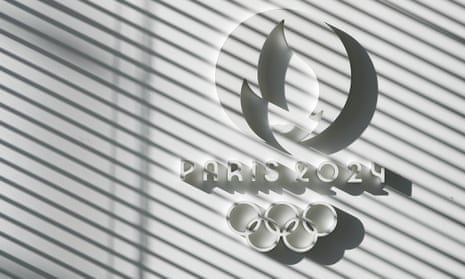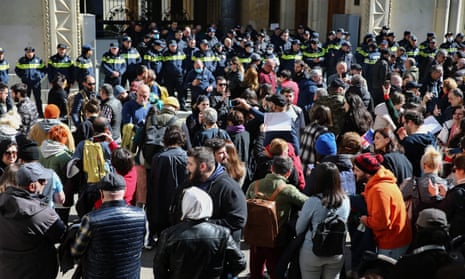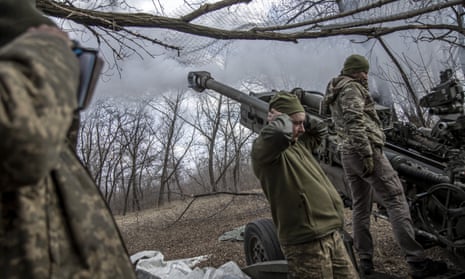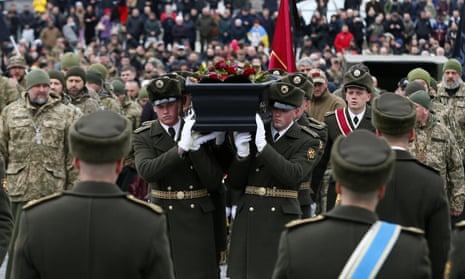Bakhmut 'killing zone' hampering Wagner advance, says UK MoD
Bakhmut has become a “killing zone” that is probably highly challenging for Russia’s Wagner mercenary forces trying to continue their assault westward, the UK Ministry of Defence has said.
Its latest intelligence update said that over the past four days, Wagner Group forces had taken control of most of eastern Bakhmut, while Ukrainian forces held its west and had demolished key bridges over the Bakhmutka River, “which now marks the front line”.
The ministry said:
With Ukrainian units able to fire from fortified buildings to the west, this area has become a killing zone, likely making it highly challenging for Wagner forces attempting to continue their frontal assault westwards.
However, the Ukrainian force and their supply lines to the west remain vulnerable to the continued Russian attempts to outflank the defenders from the north and south.
Key events Show key events only Please turn on JavaScript to use this feature
The UK government has written to Olympic sponsors urging them to pressure the International Olympic Committee over its proposal to allow Russians and Belarusians to compete at next year’s Paris Games, British media reported on Saturday.
The IOC is facing a mounting backlash after setting out a pathway in January for competitors from Russia and its ally Belarus to earn Olympic slots through Asian qualifying and to compete as neutral athletes in Paris, Reuters reported.
The British culture secretary, Lucy Frazer, addressed the letter to the UK chief executives of 13 of the Olympics’ biggest sponsors, including Coca-Cola, Samsung and Visa, outlining the government’s concerns.
Frazer wrote:
We know sport and politics in Russia and Belarus are heavily intertwined, and we are determined that the regimes in Russia and Belarus must not be allowed to use sport for their propaganda purposes.
As long as our concerns and the substantial lack of clarity and concrete detail on a workable ‘neutrality’ model are not addressed, we do not agree that Russian and Belarusian athletes should be allowed back into competition.
Ukraine has threatened to boycott the Paris Games if Russian and Belarusian athletes compete.

Bakhmut 'killing zone' hampering Wagner advance, says UK MoD
Bakhmut has become a “killing zone” that is probably highly challenging for Russia’s Wagner mercenary forces trying to continue their assault westward, the UK Ministry of Defence has said.
Its latest intelligence update said that over the past four days, Wagner Group forces had taken control of most of eastern Bakhmut, while Ukrainian forces held its west and had demolished key bridges over the Bakhmutka River, “which now marks the front line”.
The ministry said:
With Ukrainian units able to fire from fortified buildings to the west, this area has become a killing zone, likely making it highly challenging for Wagner forces attempting to continue their frontal assault westwards.
However, the Ukrainian force and their supply lines to the west remain vulnerable to the continued Russian attempts to outflank the defenders from the north and south.
Moscow has accused foreign countries of fomenting mass protests in Georgia, likening them to an attempted coup designed to sow tension on Russia’s borders.
Agence France-Presse reported that Russia’s foreign minister, Sergei Lavrov, said several days of demonstrations in the Georgian capital, Tbilisi, reminded him of a Ukrainian uprising that ultimately brought down a Kremlin-friendly presidency in 2014.
Hundreds of Georgians rallied for a fourth day outside parliament, keeping up their calls for a pro-European future, as legislators dropped the controversial “foreign agent” draft law that triggered violent clashes between police and protesters this week.

Russia invaded Georgia in 2008 and recognised two separatist territories in the north of the country as independent, stationing military bases there after the war.
The demonstrations point to turmoil over the future of Georgia, which aims to join the EU and Nato, much to the frustration of Moscow.
Summary
Hello and welcome back to our live coverage of the Russia-Ukraine war. This is Adam Fulton bringing you up to speed.
Fighting in the eastern Ukrainian city of Bakhmut had “escalated”, said Ukraine’s deputy defence minister, Hanna Malyar, with another push by Russian forces to break through Ukrainian defence lines that have largely held firm for the past six months.
Associated Press reported that just west of Bakhmut, shelling and missile strikes hit the Ukrainian-held city of Kostiantynivka on Friday. The regional prosecutor’s office said eight people were injured and more than a dozen homes damaged or destroyed.
AP journalists in the city saw at least four injured people taken to hospital. Police said Russian forces attacked the town with S-300 missiles and cluster munitions.

The attacks came as an aide to President Volodymyr Zelenskiy said Ukraine had decided to continue fighting in Bakhmut because the battle was pinning down Russia’s best units and degrading them ahead of Ukraine’s planned spring counteroffensive.
Mykhailo Podolyak’s comments to Italy’s La Stampa newspaper were the latest sign of a emphasis by Kyiv this week on continuing to defend the city after months of bloody battle.
In other developments as it turns 9am in the Ukrainian capital, Kyiv:
Most of Kyiv’s power supply had been restored, Ukrainian officials said, after Russia’s latest missile and drone barrage targeting critical infrastructure on Thursday. Power supplies were fully restored in Ukraine’s southern Odesa region, private provider DTEK said, while about 60% of households in Kharkiv city that were knocked off grid were also back online, Associated Press quoted authorities as saying. Significant damage remained in the Zhytomyr and Kharkiv regions in Ukraine’s north-west and north-east.
Finland’s prime minister, Sanna Marin, made an unannounced visit to Kyiv and met President Zelenskiy on Friday. They attended a service at St Michael’s Golden Dome cathedral in memory of Dmytro Kotsiubailo, a well-known Ukrainian military commander.
Thousands of people gathered in Kyiv to attend the funeral of Kotsiubailo. Nicknamed Da Vinci and hailed as a national hero and symbol of resistance, he was killed near Bakhmut on Tuesday, aged 27.

The underwater bombing of the Nord Stream gas pipelines in September was carried out by a team of divers operating from a 15-metre chartered yacht called the Andromeda, according to a news report. The report in Der Spiegel traces the Andromeda’s route around the Baltic from its home marina in Rostock to the German island of Rügen and then to the Danish island of Christiansø, close to the site of the 26 September blasts. Questions have been raised about whether another vessel was involved.
The British prime minister has said the war in Ukraine will end at the negotiating table. Rishi Sunak said he would support Volodymyr Zelenskiy to be in the “best possible place to have those talks” and recommitted to providing Ukraine additional military support. Sunak’s comments marked a clear divide with his predecessor, Boris Johnson, in his stance on how the war against Russia will end.
Ukrainian officials have ordered a historically Russian-aligned wing of the Ukrainian Orthodox church to leave a monastery complex in Kyiv where it is based, the latest move against a denomination regarded with deep suspicion by the government.
The head of Russia’s Wagner mercenary group has thanked Moscow for a “heroic” increase in ammunition production but said he was still worried about shortages for his fighters and the Russian army as a whole. Yevgeny Prigozhin also said on Friday that Wagner had opened recruitment centres in 42 Russian cities.
The Kremlin said it saw risks of possible “provocations” in South Ossetia and Abkhazia, two Russian-backed breakaway regions of Georgia, after days of protests in Georgia over a “foreign agents” bill. The Kremlin spokesperson, Dmitry Peskov, said Moscow was watching the situation “with concern”. The Kremlin regime sometimes issues false warnings about “provocations” for its own propaganda purposes.
The newly installed president of Cyprus, Nikos Christodoulides, denounced Russia’s invasion of Ukraine, barely 10 days after he assumed power. In his first interview with a foreign TV channel, Christodoulides told Greek state broadcaster ERT that opposing Moscow’s self-styled “special military operation” put his island on the “right side of history”.
The International Fencing Federation has decided to allow Russian and Belarusian athletes to compete in Olympic qualifying events, sparking outrage in Ukraine. Fencing became the first Olympic sport to reopen events to the aggressor and its ally, one year after their exclusion due to the war in Ukraine.

 1 year ago
57
1 year ago
57










 English (US)
English (US)